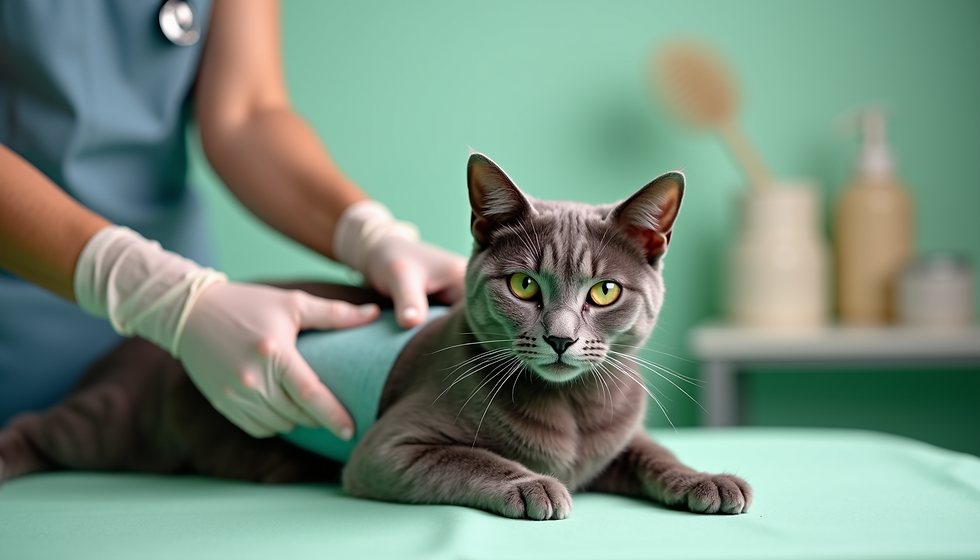Puppy Prep 101
- PetFix Veterinary Clinic
- May 30, 2025
- 4 min read
Updated: Jun 1, 2025
Congratulations on your new puppy! Welcoming a dog into your family can be daunting and we at PetFix Veterinary Clinic are here to help make it a joyful task! It is important for you to remember that getting a puppy is a responsibility that lasts its entire lifetime. We have no doubt that you will do everything you can to provide the love and care your puppy deserves!
Initial veterinary check-up
You should take your puppy to a veterinary clinic within a few days of getting it home, to get an initial physical examination and health check up. We will evaluate its health and hence give you a schedule for deworming and vaccination.
Feeding
Usually, the ideal food for the first month of life of a puppy is its mother’s milk. From 4 to 8 weeks is when the ‘weaning’ of the puppy starts. At this stage, other foods can be introduced into its diet. These can be pre-packaged foods, specific to the age of puppies, or could be home- cooked alternatives. Puppies should be fed small meals 3-4 times a day, and should always have access to fresh water.
Supervising your puppy
It is important to keep a continuous, watchful eye on your puppy for the first few months of its life. You should ‘puppy proof’ your house, keeping in mind that your puppy WILL pick up and chew anything it has access to. This will include getting rid of potentially toxic plants from your garden, putting away all drugs and medications into areas inaccessible to the puppy, tying up loose electrical cords and keeping them out of sight, having closed garbage bins, and keeping doors and windows of the house closed at all times.
House training
Puppies can usually be house trained in a short time, from a few days to few weeks, depending on how naughty your little one is! You will need to enforce a few rules to make it easy on you both. Your puppy needs to learn the acceptable place to eliminate (pee/poop), which could initially be a designated area indoors, like a balcony, or an easily accessible area outdoors. It also needs to know the consequences of eliminating indoors in the wrong place. Choosing a single elimination site, like a nearby dirt patch, for regular litter helps the puppy to establish a regular habit of eliminating there.
Most puppies will need to eliminate up to 3-4 times a day. They get a strong urge to eliminate after sleeping, playing, feeding and drinking water. Hence, you can take your puppy to its selected elimination area soon after each of each of these activities. On taking the puppy to the elimination site, you can give it a designated word of encouragement (for instance, “Come on”) to help it eliminate. After successful elimination, you should praise the puppy and reward it.
Reprimanding the puppy for inappropriate elimination indoors will only work if the puppy is caught in the act of elimination. Older puppies will need to be taken out 2-3 times a day.
Teething and chewing
From about 8 weeks until nearly 6-8 months of age, your puppy will start losing its ‘milk teeth’ and its permanent teeth will start growing in. This process can be painful and uncomfortable, causing it to chew on any and every object available to it. It is advisable to remove any small, pointy objects (such as coins, jewellery, needles, pins) from out of its reach, and provide your puppy with suitable chew toys. You could make such toys by knotting together old socks or t-shirts. A variety of chew sticks and toys are also available in pet shops, such as rope toys, Kong toys, etc. Please select a large sized toy such that it cannot be swallowed whole by the puppy, or else it could cause a choking incident. We also do not recommend toys that are too hard on the teeth.
Deworming
Deworming is an absolutely essential step to ensure your puppy’s health. Intestinal parasites such as roundworms, hookworms, tapeworms, and whipworms are common among young puppies. If not dewormed, worms can cause vomiting, loose stools, anemia, lack of appetite and interference in normal growth of the puppy. We recommend the following schedule for deworming:
First deworming | 3-4 weeks of age |
Repeat deworming | Every 15 days till 3 months of age |
Repeat deworming | Every month till 6 months of age |
Repeat deworming | Every 3 months thereafter |
Vaccination
Your puppy will require core vaccinations against some important canine viral and bacterial diseases. These vaccines will be a series of injections, covering all the fatal diseases that dogs are susceptible to. We recommend that you do not let your puppy come in contact with unvaccinated dogs, stray dogs and so on until all his vaccines are completed. It is important for you to follow the schedule given, as timely vaccinations will give the puppy proper protection. We recommend the following schedule of vaccination for your puppy
Age | Vaccination |
6–8 weeks | First core vaccine dose |
Every 2–4 weeks | Booster shots (until 16 weeks old) |
12 weeks | Anti Rabies vaccine |
16 weeks | Final puppy booster |
12 months later | First adult booster |
Every year | Ongoing boosters (based on vet recommendation) |


Comments